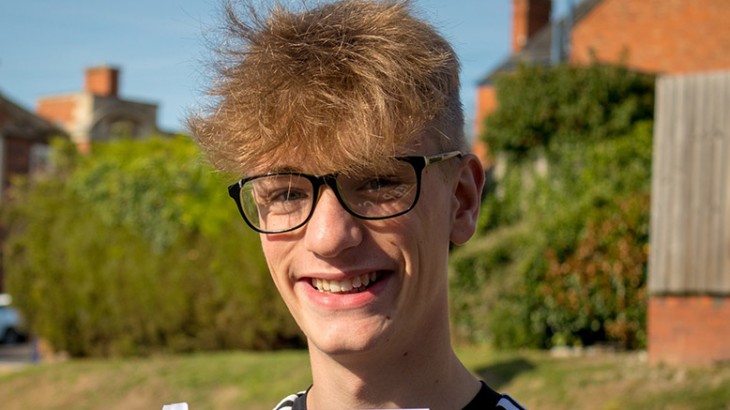Harvey’s story

Since October 2017, more than 3,000 young people have been supported by and benefitted from the Blues Programme - Action for Children’s internationally-acclaimed evidence based ‘blues busting’ course for teenagers.
Until 17 October, Action for Children are asking colleagues to join in with the celebrations for the programme’s two-year anniversary. Check out their ‘Beating the Blues fundraising fun’ sheet for ideas to promote positive mental health and fundraising activities in your unit.
Today, Action for Children have agreed to share Harvey’s story — a teenager who was supported by, and benefitted from, the programme. Next week, we’ll explain how Harvey’s mental health issues affected his father, Paul.
Sixteen-year-old Worcestershire schoolboy, Harvey Sparrow began to feel overwhelmed with schoolwork when studying for his GCSEs. As his anxiety levels rose, his grades went downhill and in his words, ‘it all got a bit too much.’
Harvey began isolating himself from family and friends and when he started feeling worthless and overwhelmed, he confided in his dad, who decided to seek help. A visit to the doctor made Harvey feel worse than ever as the doctor was dismissive and didn’t seem to understand the extent of his anxiety.
After some persistence, Harvey was referred to Child and Adolescent Mental Health Services (CAMHS) - the name for NHS-provided services in the UK for children, who are having difficulties with their emotional or behavioural well-being, but there was a long waiting list.
At school, Harvey was offered a place on the Blues Programme, which helped him understand where his negative mood was coming from. ‘I was able to put some coping strategies in place to help myself and take control of my anxiety and depression,’ he said. ‘It was a turning point as things previously felt so hopeless for me.’
Harvey completed the programme and went on to access CAHMS support. Although in a better position now, Harvey feels that he didn’t have much control over when he stopped receiving CAHMS support. He says that he would have benefitted from more sessions, but due to a lack of funding, this wasn’t possible. ‘I wasn’t ready to stop receiving support,’ he said.’ But I was told, “you’re ok, you don’t need further help,” which can be hard to take as it’s completely out of your control.
‘It’s hard to see a lot of my friends struggling with mental health issues – some can afford private healthcare, however, it’s tough to see the ones who can’t receive the care they need to deal with preventable issues.’
Reflecting on childhood in general today, Harvey, said: ‘Although mental health issues are more expected, our generation is dealing with new challenges. You always feel that you should look and be like what you see in newspapers, magazines and on social media – it’s pressure you can’t escape from.’
Harvey feels that his friends and peer group communicate in a very different way in comparison to generations before. ‘Getting a phone call, rather than a message feels like a big deal as someone has gone out of their way to speak to you one-on-one,’ he said. ‘Messaging, texts and social media make relationships far less special.’
Royal Mail and Action for Children are working together to deliver better youth mental health across the UK. Thank you for all your support! If you have any questions or you would like any further information, please email Vicky at RoyalMail@actionforchildren.org.uk.



